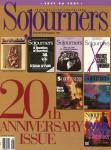The recent wave of Desert Storm euphoria that swept through victory parades around the country succeeded in diverting our attention away from the messy business of post-war Iraq -- at least temporarily. But to Iraqis still digging out, the war has only taken on a different form -- the continuation of economic sanctions which may ultimately be more devastating than the massive allied bombings.
"Again and again, the Iraqi people ask, 'If you won the war, why do you continue to fight us? Why can't you leave us alone to pick up the pieces?' " relates Anne Grace, Middle East representative of the American Friends Service Committee (AFSC), who recently visited Baghdad.
The Bush administration hopes the sanctions will eventually lead those loyal to Saddam Hussein to try out of desperation to oust the dictator. But foreign reporters in Iraq are told that the Iraqi elite -- especially the president -- are largely immune to the sanctions.
"The sanctions don't affect the regime," said one government insider. "They have money, cars. They can buy their way out. The poor cannot."
Most Iraqis are not able to buy high-priced foodstuffs on the open market and must depend on inadequate rations of staples such as flour, rice, and cooking oil. Clean drinking water is at a premium.
Iraqi trade for food and medicines was officially lifted from the sanctions as part of the cease-fire agreement, yet the U.N. sanctions monitoring committee denied an Iraqi request in late May to export $1 billion worth of oil to purchase those essentials. Meanwhile, the Iraqi government has protested U.N. suggestions that it pay 30 percent of its oil revenues to Kuwait as war reparations.
While massive international relief efforts are under way, a humanitarian disaster of monumental proportion is unfolding in Iraq due to the lack of adequate food, medicine, and sanitation. After conducting a study of areas throughout Iraq in early May, a team from the Harvard School of Public Health projected that at least 170,000 children under the age of 5 will die in the coming year from malnutrition or water-borne infectious diseases. And a recent study by UNICEF, Helen Keller International, and Save the Children found vitamin A deficiency -- a primary cause of blindness in the Third World -- to be "a significant health problem" in southern Iraq.
Gabriel Habib, general secretary of the Middle East Council of Churches, recently expressed gratitude to U.S. church people who maintained a "distinctive ethical and moral voice" against the Gulf war and have continued providing humanitarian assistance to the war's victims, but he also called on U.S. Christians to press the U.S. government to lift non-military sanctions.
Thus far, there has been no concerted effort among the churches and humanitarian community to do so, although grassroots pressure is building as recent American delegations to Iraq return with firsthand documentation of malnutrition and disease due to the lack of basic needs.
"A generation of babies should not be allowed to die because politically we have not been able to topple the head of the government," Delores Brooks, O.P., a Dominican sister from Chicago who recently returned from Iraq, told Sojourners.
"The war is not over," stresses Stephen Slade, co-director of the Salinas, California-based Out Now! "It is just entering its final and most deadly phase."
Judy Coode assisted with research.

Got something to say about what you're reading? We value your feedback!